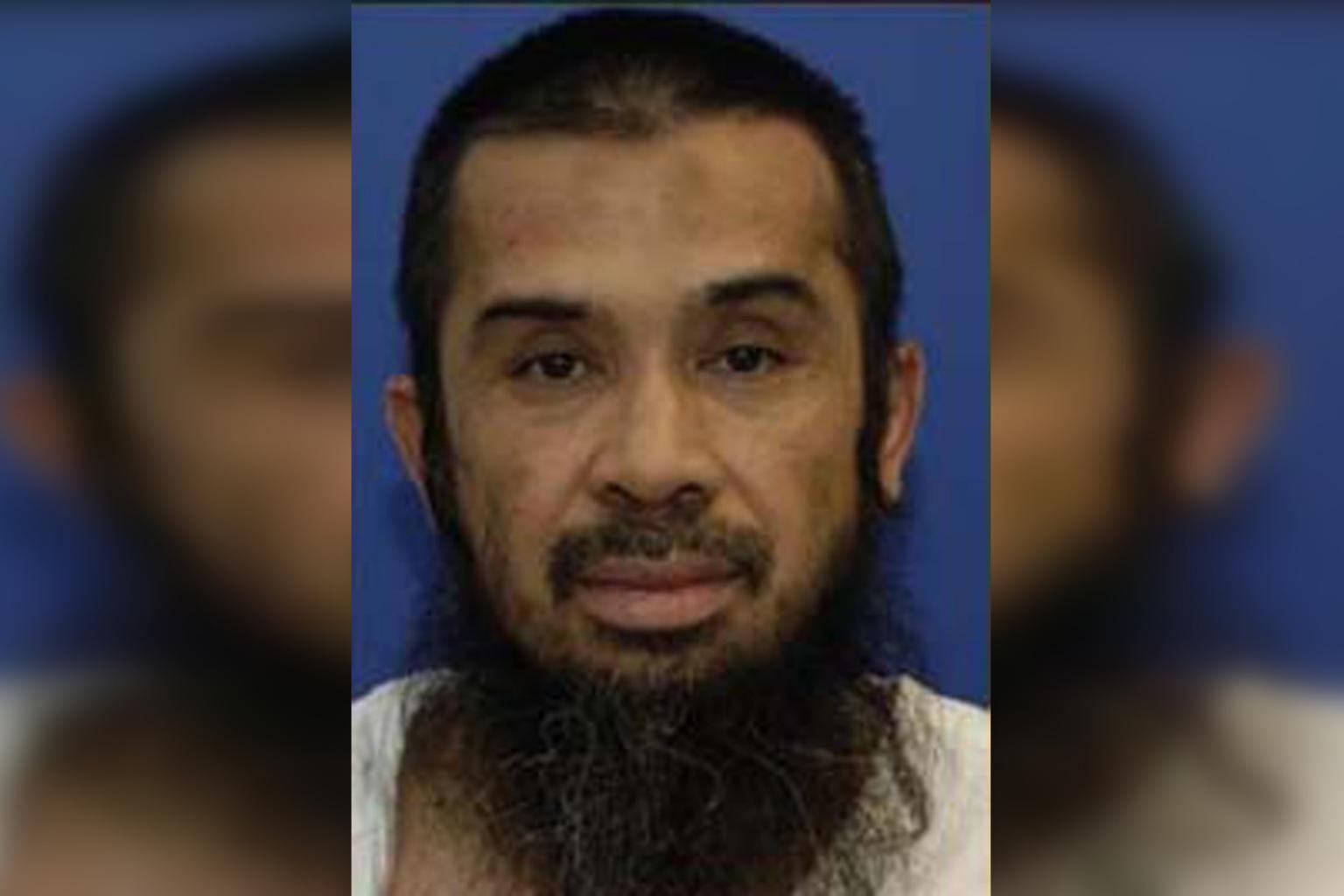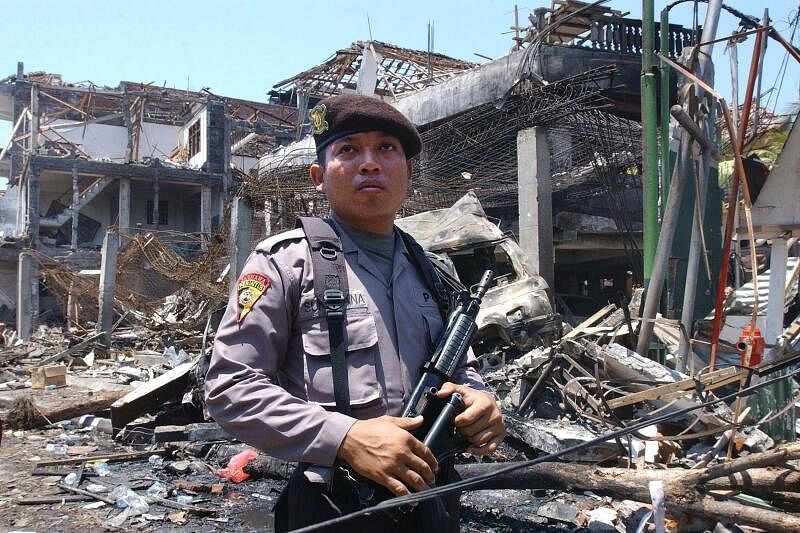Bali, Jakarta bombings suspect Hambali to be tried on Aug 30 by US military
Sign up now: Get ST's newsletters delivered to your inbox

Riduan Isamuddin, also known as Hambali, will face a formal arraignment in front of a military commission in Guantanamo Bay on Aug 30.
PHOTO: US DEPARTMENT OF DEFENSE
Follow topic:
WASHINGTON - The world will soon get a new look at the man accused of plotting the October 2002 bombing in Kuta, Bali, that killed 202 people, and the 2003 attack at the JW Marriott hotel in Jakarta that killed 11.
Riduan Isamuddin, also known as Hambali, and his two associates will face a formal arraignment in front of a United States military commission in Guantanamo Bay on Aug 30.
It has been some 18 years coming. Hambali, now about 57, was captured in Ayutthaya, Thailand, on Aug 14, 2003 in a joint US-Thai operation and transferred to Guantanamo in September 2006.
He is believed by investigators to have masterminded the strategy of the Jemaah Islamiyah (JI) terror organisation of striking at soft targets. JI has previously been linked to Al-Qaeda and later to the Islamic State in Iraq and Syria.
Hambali was not formally charged in the US with any crime until January this year and remains wanted in Malaysia, Singapore and the Philippines in connection with terrorist plots.
In Dec 2001, 15 JI operatives were arrested in Singapore for planning attacks on government buildings, embassies and US servicemen in the Republic.
In 2002 came the Bali bombing - the worst terrorist attack ever on Indonesian soil. Then in 2003, the group carried out the bombing at the JW Marriott in Jakarta.
The charges list Hambali as "Encep Nurjaman, also known as Riduan bin Isomudin, alias HAMBALI".
Two others who will stand trial with him are Mohammed Nazir Lep, alias Lillie, and Mohammed Farik Amin, also known as Zubair.
An appendix provides a long list of other aliases of the three.
The charge sheet dated April 2019 lays out, in chilling detail, planning by the three as "principals, as co-conspirators, and as participants" of the Bali and Jakarta attacks, and a string of other plans for attacks against Americans and American interests - including the idea of attacking American servicemen and sinking an American warship in Singapore.
The three are classified as "alien unprivileged enemy belligerents".
The trio is standing trial on Aug 30 for "offences triable by military commission, including murder in violation of the law of war, attempted murder in violation of the law of war, intentionally causing serious bodily injury, terrorism, attacking civilians, attacking civilian objects, and destruction of property in violation of the law of war".

The Bali bombing in October 2002 was the worst terrorist attack ever on Indonesian soil.
PHOTO: AFP
Defence attorneys appointed by the military will speak in their defence. One of the principal points they will be making is that Hambali was tortured in detention.
Additionally, the charge sheet states that "From on or about August 1996 to on or about August 2003, at multiple locations in or around Afghanistan, South-east Asia and elsewhere, the three knowingly conspired and agreed with… Usama bin Laden, Khalid Shaikh Mohammad, Abu Ba'aysir, Abdullah Sungkar and others, known and unknown".
The Pakistani militant Khalid Shaikh Mohammad is accused of masterminding the Sept 11, 2001 attacks in the US and is also being held at the Guantanamo Bay prison on terrorism-related charges.
As the 20th anniversary of the Sept 11 attacks approaches, Khalid Shaikh Mohammad may also finally see a long-delayed formal trial. In summer 2019, a military judge set the date for January 2021, but amid the Covid-19 pandemic, it was again postponed. A new date has not been set.
Hambali directed plots against Singapore targets
Until his arrest in 2003, Riduan Isamuddin, also known as Hambali, played a prominent role in the Jemaah Islamiah (JI) terror organisation.
The Indonesian headed the JI's regional shura, its policymaking body, and was also the group's operational chief responsible for a string of attacks in South-east Asia. He headed JI's Malaysia and Singapore divisions until the latter half of 2001, when he was wanted by the Malaysian authorities over the violence linked to the affiliated Kumpulan Militant Malaysia, according to Singapore's Ministry of Home Affairs.
Hambali directed the JI in supporting an Al-Qaeda plot to simultaneously bomb foreign targets in Singapore in December 2001 with trucks rigged with ammonium nitrate. Potential targets included the United States and Israeli embassies, the Australian and British High Commissions, Sembawang Wharf and Changi Naval Base - both of which had American military personnel stationed there - as well as commercial buildings housing American companies.
Singapore's Internal Security Department later discovered that the JI had at least five other plans to attack foreign and local assets in Singapore, including Changi Airport, the Ministry of Education building at North Buona Vista Drive and the Ministry of Defence headquarters in Bukit Gombak.
The US State Department said the JI was also planning to target US warplanes stationed at Paya Lebar Air Force Base and US warships along Singapore's coastline.
Hambali was also suspected to be Al-Qaeda's operations director for East Asia. In 1999, he helped the militant Islamist organisation arrange surveillance filming of a potential bombing target in Singapore - a regular shuttle bus service conveying US military personnel between Sembawang Wharf and the Yishun MRT station.
Who is Hambali?
Born in 1963, Riduan Isamuddin, also known as Hambali, was the son of a farmer and the second of 13 children.
He earned a degree in biology from an Indonesian university before travelling to Malaysia in 1985, seeking employment.
Hambali was among the first Indonesian militants to go to Afghanistan in 1987 to combat the Soviet occupation. It was there that he met Osama Bin Laden, and established close ties with the terrorist network, Al-Qaeda.
Hambali was also a protégé of Abdullah Sungkar, the founder of the similarly extremist Jemaah Islamiah (JI), and was often seen by his mentor's side before the latter's death in 1999.
Among various roles, Hambali was a former Al-Qaeda leader and key point man for Osama in South-east Asia, as well as the former operations chief of JI.
Referred to by some as the Osama Bin Laden of South-east Asia, Hambali sparked concern from officials in the region when he requested his release from Guantanamo Bay in 2016. The request was denied by prosecutors, who said he still represented a "significant threat to the security of the United States".
Hambali met his Malaysian wife, Noraliza Abdullah, also known as Lee Yin Len, at a religious school he and other JI leaders founded in Johor.
Following her husband's capture in Thailand in 2003, Noraliza was detained by police under Malaysia's Internal Security Act until 2005. She has not been seen since her release and is believed to be living in Indonesia with Hambali's relatives.
One of Hambali's brothers, Rusman Gunawan, is a founder of a JI group formed to groom the next generation of extremist leaders. Arrested in Pakistan in 2003 and deported to Indonesia later the same year, Gunawan was convicted in 2004 for his involvement in the 2003 bombing of the JW Marriott hotel in Jakarta.

